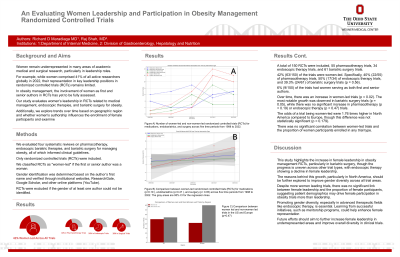Sunday Poster Session
Category: Obesity
P1445 - Evaluating Women Leadership and Participation in Obesity Management Randomized Controlled Trials
Sunday, October 27, 2024
3:30 PM - 7:00 PM ET
Location: Exhibit Hall E

Has Audio
.jpg)
Richard Maradiaga, MD
The Ohio State University Wexner Medical Center
Columbus, OH
Presenting Author(s)
Richard Maradiaga, MD, Raj Shah, MD
The Ohio State University Wexner Medical Center, Columbus, OH
Introduction: Recent studies underscored the scarcity of women-led randomized controlled trials (RCTs) across various medical fields. However, it remains unclear if this trend extends to RCTs that shape medical guidelines for obesity management. We aimed to evaluate the involvement of women as authors and participants in obesity management RCTs.
Methods: Four guidelines with systematic reviews and meta-analyses on pharmacotherapy, endoscopic therapies, and bariatric surgeries for managing obesity were assessed. We evaluated the RCTs published from 1998 to 2022. Women-led RCTs were defined as those with a woman as either a first or senior author. Chi-square, Fisher Exact, linear regression, and Point-biserial correlation tests were used for analysis.
Results: 55 pharmacotherapy, 34 endoscopic therapy, and 61 bariatric surgery RCTs met the criteria. 63 (42%) were women-led and 9 (6%) RCTs had women as first and senior authors. The proportions of women-led trials were 40% (22/55) for pharmacotherapy, 50% (17/34) for endoscopic therapy, and 39.3% (24/61) for surgery (p = 0.56). Trends in women-led and non-women-led RCTs are shown in Figure 1A. An increase in women-led trials over time was observed (p = 0.02), with a significant growth in surgical women-led RCTs (p = 0.05), but not pharmacotherapy or endoscopic therapy RCTs (p = 0.19, p = 0.47) (Figure 1B). When analyzed by region, the odds of a study being women-led in North America compared to Europe were 1.76 times higher, although the difference was not significant (p = 0.179). There was no significant correlation between women-led trials and the proportion of women participants enrolled in the RCTs of any trial type. However, women comprised 67.6%, 78.8%, and 71.1% of the RCT participants in pharmacotherapy, endoscopic therapy, and bariatric surgery trials.
Discussion: The proportion of women-led RCTs in obesity management is better in North America than Europe. An increase in women-led trials during the study period was seen, with the largest rate of female leadership in bariatric surgery and a drop in endoscopic therapy trials over the last decade. Analysis of how bariatric surgery improved or how North America increased female leadership would be important for implementing quality improvement initiatives. Further efforts are needed to support and understand how to increase women's leadership in clinical research to enhance diversity and inclusion in the field of obesity.

Disclosures:
Richard Maradiaga, MD, Raj Shah, MD. P1445 - Evaluating Women Leadership and Participation in Obesity Management Randomized Controlled Trials, ACG 2024 Annual Scientific Meeting Abstracts. Philadelphia, PA: American College of Gastroenterology.
The Ohio State University Wexner Medical Center, Columbus, OH
Introduction: Recent studies underscored the scarcity of women-led randomized controlled trials (RCTs) across various medical fields. However, it remains unclear if this trend extends to RCTs that shape medical guidelines for obesity management. We aimed to evaluate the involvement of women as authors and participants in obesity management RCTs.
Methods: Four guidelines with systematic reviews and meta-analyses on pharmacotherapy, endoscopic therapies, and bariatric surgeries for managing obesity were assessed. We evaluated the RCTs published from 1998 to 2022. Women-led RCTs were defined as those with a woman as either a first or senior author. Chi-square, Fisher Exact, linear regression, and Point-biserial correlation tests were used for analysis.
Results: 55 pharmacotherapy, 34 endoscopic therapy, and 61 bariatric surgery RCTs met the criteria. 63 (42%) were women-led and 9 (6%) RCTs had women as first and senior authors. The proportions of women-led trials were 40% (22/55) for pharmacotherapy, 50% (17/34) for endoscopic therapy, and 39.3% (24/61) for surgery (p = 0.56). Trends in women-led and non-women-led RCTs are shown in Figure 1A. An increase in women-led trials over time was observed (p = 0.02), with a significant growth in surgical women-led RCTs (p = 0.05), but not pharmacotherapy or endoscopic therapy RCTs (p = 0.19, p = 0.47) (Figure 1B). When analyzed by region, the odds of a study being women-led in North America compared to Europe were 1.76 times higher, although the difference was not significant (p = 0.179). There was no significant correlation between women-led trials and the proportion of women participants enrolled in the RCTs of any trial type. However, women comprised 67.6%, 78.8%, and 71.1% of the RCT participants in pharmacotherapy, endoscopic therapy, and bariatric surgery trials.
Discussion: The proportion of women-led RCTs in obesity management is better in North America than Europe. An increase in women-led trials during the study period was seen, with the largest rate of female leadership in bariatric surgery and a drop in endoscopic therapy trials over the last decade. Analysis of how bariatric surgery improved or how North America increased female leadership would be important for implementing quality improvement initiatives. Further efforts are needed to support and understand how to increase women's leadership in clinical research to enhance diversity and inclusion in the field of obesity.

Figure: Figure 1: A) Number of women-led and non-women-led randomized controlled trials (RCTs) for medications, endobariatrics, and surgery across five time periods from 1998 to 2022. B) Comparison between women-led randomized controlled trials (RCTs) for medications (p=0.19 ), endoscopic therapy (p=0.47 ), and surgery (p= 0.05) across five time periods from 1998 to 2022. The gray areas are 95% CI for the regression lines.
Disclosures:
Richard Maradiaga indicated no relevant financial relationships.
Raj Shah indicated no relevant financial relationships.
Richard Maradiaga, MD, Raj Shah, MD. P1445 - Evaluating Women Leadership and Participation in Obesity Management Randomized Controlled Trials, ACG 2024 Annual Scientific Meeting Abstracts. Philadelphia, PA: American College of Gastroenterology.
